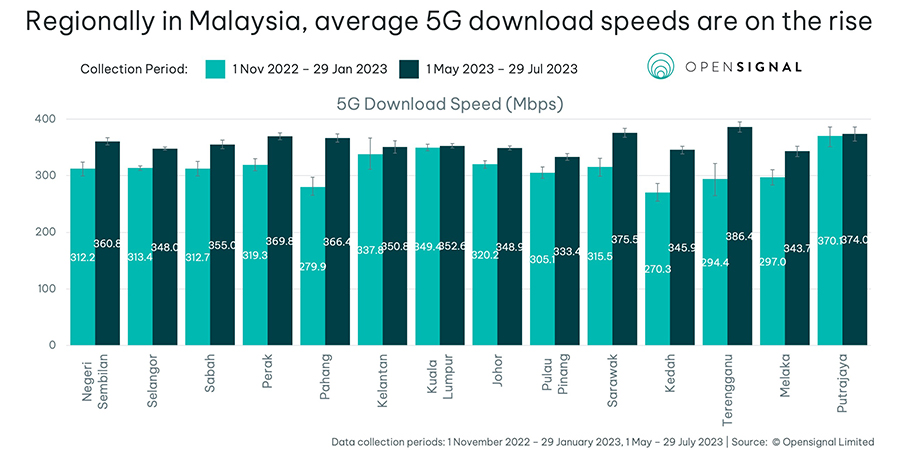Malaysia's innovative 5G network deployment strategy, which uses a single national wholesale network owned by Digital Nasional Berhad (DNB), is yielding promising results. To address cost and competition issues, Malaysia recently announced its intentions to launch a second 5G network if DNB's coverage reaches 80% of the population.
YTL (Yes) became the first Malaysian operator to commercially launch 5G services in May 2022. In November 2022, five more operators, including Celcom, Telekom Malaysia (Unifi), U Mobile and Digi, followed suit. Maxis finally joined the 5G market in August 2023.
An Opensignal report shows a significant improvement in the mobile experience of network users between November 2022 and July 2023, particularly in 5G availability and 5G download speeds. 5G availability has risen to 21%, implying that Malaysian 5G customers now spend more than a fifth of their time connected to a 5G network. Concurrently, the 5G download speed has increased to an astonishing 353.1 Mbps.
When comparing the overall experience of 5G users to the average mobile experience in the country, 5G users have a significant advantage, particularly in terms of speed. 5G users receive download speeds that are more than triple the average in Malaysia, hitting 105.8 Mbps. Likewise, upload speeds are roughly twice as fast as the national average.
Furthermore, 5G users had a better mobile gaming experience, with scores ranging from “Good” (75-85) to "Fair" (65-75), whereas the typical user falls into the "Fair" (65-75) category. This suggests that 5G users get a smoother gaming experience with rapid feedback and minimum input delay.
According to Opensignal, 4G download speeds have also increased by over 20%. It is possible that 5G is contributing to this increase by reducing congestion on the 4G network, hence improving overall 4G performance.
Even with these speed improvements, both the relative and absolute boost provided by 5G are massive. Upload speeds are 5.4 times faster for 5G users than for 4G users, representing a 35.2 Mbps absolute speed improvement. Meanwhile, download speeds increased to 328.5 Mbps compared to 297.3 Mbps in November 2022, equivalent to a current increase of 14.4 times for customers with active 5G connections.
Except for Kuala Lumpur, Kelantan and Putrajaya, all other regions in Malaysia have shown a statistically significant increase in 5G download speed. Terengganu stands out with a significant increase of 91.9 Mbps.
Furthermore, several regions have also made significant progress in terms of 5G availability, which counts the proportion of time 5G users spend with an active 5G connection. Pahang's score has more than doubled, while Kedah and Terengganu's scores have tripled. Seven of the remaining 11 areas have similarly improved, with Sabah, Sarawak, Melaka and Putrajaya remaining unchanged.
5G is still relatively new in Malaysia, but the benefits of it are already evident. Users of 5G have much faster mobile experiences and improved gaming performance. The speed increase over 4G is significant, with upload rates 5.4 times quicker and download speeds 14.4 times faster.
With all six telcos on board, the future of Malaysia's 5G network appears promising, with room for additional expansion and improvement.






